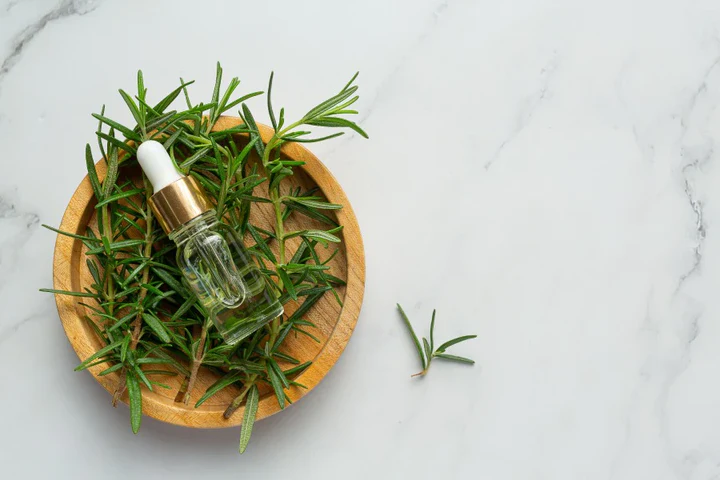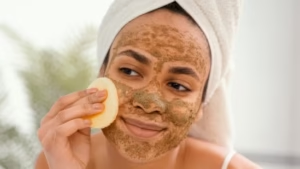Introduction
Hair fall has become one of the most common concerns today, with stress, pollution, and chemical-laden products only making it worse. In the search for natural and affordable remedies, rosemary water has taken the internet by storm. Touted as a miracle elixir for hair growth, it’s gaining popularity on platforms like TikTok, YouTube, and Instagram. But the big question remains: Does rosemary water really work for hair growth, or is it just another overhyped trend?
In this post, we’ll dive into the science, benefits, usage methods, and real-world effectiveness of rosemary water to answer that very question.
What Is Rosemary Water?
Rosemary (Rosmarinus officinalis) is a fragrant evergreen herb native to the Mediterranean region. For centuries, it’s been used in cooking, medicine, and beauty rituals. Rosemary water is simply a water-based infusion made by steeping rosemary leaves (fresh or dried) in hot water.
It’s rich in:
- Antioxidants
- Anti-inflammatory compounds
- Essential nutrients like iron and calcium
- Rosmarinic acid, known for stimulating blood circulation
These compounds are believed to nourish the scalp, stimulate hair follicles, and promote healthier, stronger hair.
The Science Behind Rosemary and Hair Growth
You’re probably wondering, is there any actual science behind this trend?
Yes, there is!
A 2015 study published in SkinMed compared rosemary oil with minoxidil (2%), a common hair growth medication. The result? Rosemary oil performed similarly to minoxidil after 6 months—with fewer side effects like scalp itching.
Although the study used rosemary oil, not water, many believe rosemary water retains similar benefits, especially when used consistently.
Top Benefits of Rosemary Water for Hair

1. Stimulates Hair Growth
This water enhances blood circulation to the scalp, ensuring hair follicles receive more oxygen and nutrients. This can trigger the growth of new strands and reduce thinning.
2. Reduces Hair Fall
By strengthening hair from the root and improving scalp health, this water may help reduce hair fall caused by breakage or poor scalp conditions.
3. Fights Dandruff and Itchy Scalp
Thanks to its antibacterial and anti-inflammatory properties, this water helps soothe itchiness, flakiness, and irritation caused by dandruff or buildup.
4. Improves Hair Texture
Regular use of this water can lead to shinier, softer, and more manageable hair.
5. Delays Premature Greying
Some anecdotal evidence suggests rosemary helps in slowing down premature greying due to its antioxidant content, although more research is needed here.
How to Make Rosemary Water at Home
Making rosemary water is easy, cost-effective, and chemical-free.
DIY Rosemary Water Recipe
Ingredients:
- 1 cup of water
- 1–2 tablespoons of dried rosemary (or a few sprigs of fresh rosemary)
Steps:
- Boil the water.
- Add rosemary to the water and let it steep for 15–20 minutes.
- Allow it to cool.
- Strain the liquid into a spray bottle or container.
- Store in the fridge for up to 7 days.
Optional: Add a few drops of rosemary essential oil for added potency.
How to Use Rosemary Water for Hair Growth

1. As a Scalp Spray
Spray this water directly onto your scalp daily. Massage gently to boost blood circulation. No need to rinse.
2. Post-Wash Rinse
After shampooing and conditioning, pour this water over your scalp as a final rinse. Let it air dry naturally.
3. In Hair Masks or Oils
Mix this water into your hair masks or add it to aloe vera gel for an extra hair-loving boost.
How Often Should You Use It?
For visible results, consistency is key. Use at least 3–4 times a week for 2–3 months. Some users report noticeable changes in hair thickness and texture within the first month.
Before & After Results: What to Expect

While results can vary based on hair type and underlying conditions, common experiences include:
- Less hair fall within a few weeks
- Improved shine and strength
- Baby hair growth after 1–2 months
- Fuller hairline and reduced bald spots over time
Pro tip: Take pictures every 2 weeks to track progress!
Who Should Avoid Rosemary Water?
While generally safe, this water may not be suitable for:
- People with allergies to rosemary
- Pregnant or breastfeeding women (consult a doctor before use)
- Those with scalp wounds or conditions—avoid applying until healed
Always do a patch test before full application to avoid adverse reactions.
Common Myths Debunked
1: It Works Overnight
Truth: This water takes time to show results. Expect at least 4–6 weeks of consistent use.
2: The More You Use, the Faster It Works
Truth: Overuse can cause dryness or irritation. Stick to 3–4 times per week.
3: It Works for Everyone
Truth: Results depend on factors like genetics, diet, and underlying conditions.
Tips to Maximize Results
- Use with a scalp massager to stimulate circulation.
- Pair with a healthy, protein-rich diet.
- Avoid heat styling and harsh chemical treatments during your rosemary water routine.
- Stay hydrated—your scalp needs moisture too!
Rosemary Water vs. Rosemary Oil: Which Is Better?
| Feature | Rosemary Water | Rosemary Oil |
|---|---|---|
| Dilution Required | No | Yes (with carrier oil) |
| Ease of Use | Easy (spray/apply) | Slightly more effort |
| Potency | Mild to moderate | High |
| Ideal For | Sensitive scalps | Advanced users |
Verdict: Start with rosemary water if you’re a beginner or have sensitive skin. Switch to oil later if you want more intense results.
Final Verdict: Miracle or Myth?
So, is rosemary water for hair growth a miracle or a myth?
Verdict: It’s closer to a miracle—if used consistently and correctly.
While it may not be a magic fix for everyone, science and anecdotal evidence both support its benefits. It’s an affordable, natural, and low-risk remedy to add to your haircare routine—especially for those struggling with hair fall or thinning.
THE POST YOU MAY LOVE: Rice Water for Skin: The Secret to Korean Glass Skin?
Conclusion
In a world flooded with expensive hair serums and treatments, rosemary water stands out as a simple, effective, and natural solution. Whether you’re facing hair fall, dullness, or slow growth, it’s definitely worth a try.
Have you tried rosemary water? Share your experience in the comments below—we’d love to hear how it worked for you!
And if you loved this guide, don’t forget to check out more haircare tips and natural remedies on fitgood360.com!





You completed a number of nice points there. I did a search on the matter and found nearly all persons will consent with your blog.
Thank you so much! I’m glad the points made sense and matched what you found.
We are a group of volunteers and opening a new scheme in our community. Your web site provided us with helpful info to paintings on. You’ve performed an impressive activity and our entire community will be thankful to you.
Thanks a ton! It makes me so happy to know my content could support your volunteer work. Wishing your community project lots of success
We are a bunch of volunteers and starting a new scheme in our community. Your website provided us with useful information to work on. You have done an impressive job and our entire community will likely be grateful to you.
Thank you for the kind words! It’s great to know my work is making a difference—best of luck to your community initiative.